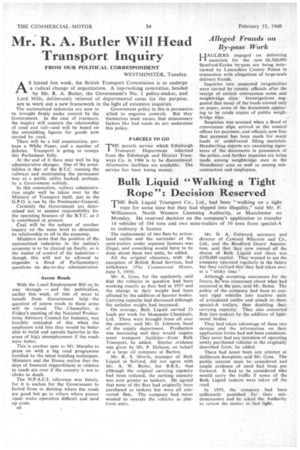Mr. R. A. Butler Will Head Transport Inquiry
Page 42

If you've noticed an error in this article please click here to report it so we can fix it.
FROM OUR POLITICAL CORRESPONDENT WESTMINSTER, Tuesday.
AS hinted last week, the British Transport Commission is to undergo a radical change of organization. A top-ranking committee, headed by Mr. R. A. Butler, the Government's No. 1 policy-maker, and Lord Mills, deliberately relieved of departmental cares for the purpose, are to work out a new framework in the light of extensive inquiries.
be brought firmly under control by the Government. In the case of transport, the inquiry will concern the relationship of road and rail—and will be based on the astonishing figures for goods now carried by road.
There will be a full examination, perhaps a Whhe Paper, and a number of debates. Transport is going to occupy this Parliament fully.
At the end of it there may well be big administrative changes. One of the possibilities is that of the B.T.C. running the railways and maintaining the permanent way as a public utility backed, perhaps, by a Government subsidy.
In this connection, railway, administration might well be taken over by the Ministry of Transport itself, just as the G.P.O. is run by the Postmaster-General.
Certainly the Government are determined not to assume responsibility for the operating finances of the B.T.C. as it is constituted at present.
Coal will be the subject of another inquiry on the same level to determine its relationship to oil in the economy.
Ministers insist that the position of the nationalized industries in the nation's economy is to be cleared up finally, as is the matter of control of the industries— though this will not be allowed to engender a flood of Parliamentary questions on day-to-day administration.
Access Roads
With the Local Employment Bill on its way through — and the publicalion, earlier this week, of lists of areas to benefit from Government help—the question of access roads to these areas will be raised. The Chancellor, at Friday's meeting of the National Productivity Advisory Council for Industry, was forcibly reminded of this when the employers told him they would he better able to build and operate factories in the areas of high unemployment if the roads were better.
This is another spur to Mr. Marples to press on with a big road programme fortified by the latest building techniques. Ministers and the House realize that the days of financial niggardliness in relation to roads are over if the country is not to choke to death.
The N.P.A.C.I. reference was timely, for it is useless for the Government to forbid firms to develop where the roads are good but go to others where poorer rcjads make operation difficult and send up costs.
allied to negative controls. But they themkelves must ensure that unoccessary factors like bad roads do not undermine this policy.
PARCELS TO GO
'THE parcels service which Edinburgh J. Transport Department inherited from the Edinburgh and District Tramways Co. in 1904 is to be discontinued. Alternative facilities are available. The service has been losing money.




















































































































